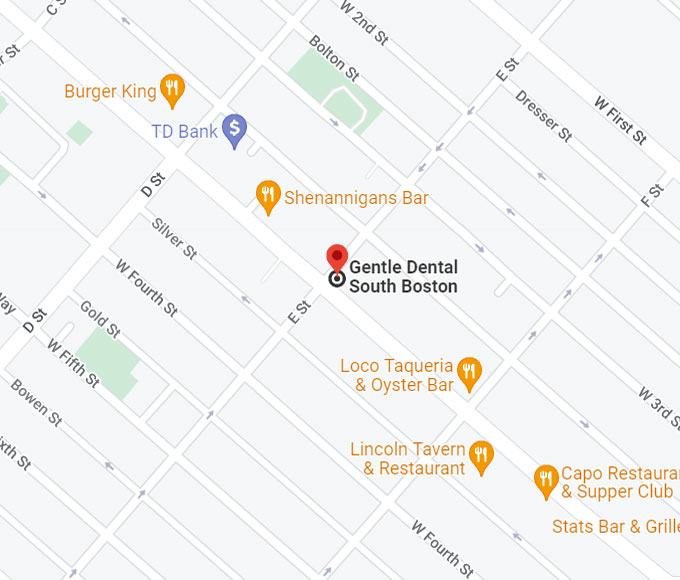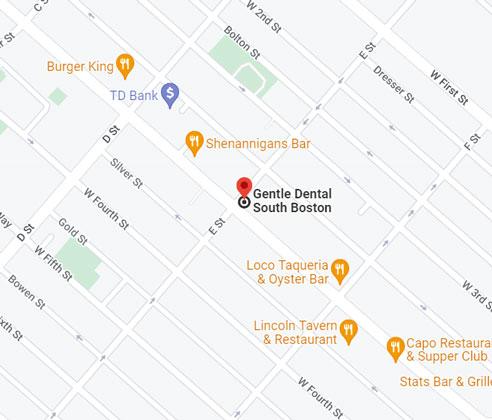- Locations
- Locations
- Arlington
- Attleboro
- Belmont
- Beverly
- Boston
- Braintree
- Brockton
- Brookline
- Burlington
- Cambridge
- Chelmsford
- Concord, NH
- Derry, NH
- East Longmeadow
- Exeter, NH
- Franklin
- Hanover
- Hudson
- Keene, NH
- Malden
- Manchester, NH
- Medford
- Methuen
- Milford
- Nashua, NH
- Natick
- New Bedford
- North Andover
- Norwood
- Peabody
- Quincy
- Raynham
- Rochester, NH
- Saugus
- Seekonk
- Somerville
- Stoughton
- Wakefield
- Waltham
- Worcester
- Dental Services

Pediatric Dentistry in South Boston
At Gentle Dental South Boston, we provide exceptional pediatric dental care in a warm and welcoming environment, making every visit enjoyable for our young patients.
Dental Office Hours
Monday 7:00 AM - 6:30 PM
Tuesday 7:00 AM - 7:00 PM
Wednesday 7:00 AM - 7:00 PM
Thursday 7:00 AM - 7:00 PM
Friday 8:00 AM - 4:00 PM
Saturday 8:00 AM - 4:00 PM
Sunday CLOSED
More Information
Metered street parking available. 10 Minute walk from Broadway Station.
Dental Office Hours
Monday 7:00 AM - 6:30 PM
Tuesday 7:00 AM - 7:00 PM
Wednesday 7:00 AM - 7:00 PM
Thursday 7:00 AM - 7:00 PM
Friday 8:00 AM - 4:00 PM
Saturday 8:00 AM - 4:00 PM
Sunday CLOSED
More Information
Metered street parking available. 10 Minute walk from Broadway Station.
Gentle Dental South Boston Reviews
I had a great experience at Gentle Dental in South Boston. Dr Jacob was very patient in explaining the type of work I would need to have done to correct a poor filling done by another dental group. He talked to me about potential risks (risk of a root canal), and what to expect at that visit and for upcoming follow up work. I had a lot of questions and a lot of anxiety and he really calmed me down and made me feel that I could trust him and his team. His assistant Tina was also great - very efficient and good at the work she did. The overall dental office team was professional and pleasant and they were good communicators when there needed to be a delay in my follow up visit. The outcome of my dental work here was perfect. I highly recommend this dental office and Dr J
Ellen has been absolutely incredible with my wild and wiggly toddler for her dental cleanings. We've been seeing her for a few years now and my daughter has been comfortable since day one. Absolutely recommend.
Dental Services In South Boston
At Gentle Dental South Boston, we thoughtfully craft our services to prioritize your child's comfort and well-being. From their first visit to their teenage years, we provide comprehensive dental care tailored to their changing needs. Discover our wide range of services below and see how we can help ensure your child's oral health stays strong and vibrant throughout their development.
Preventive Care
Restorative Care
Crowns and Bridges
Dental Fillings
Extractions
Gum Treatments
Implants
Oral Surgery
Partial and Full Dentures
Root Canals
Wisdom Teeth Extractions
Orthodontics
Additional Services
What is Pediatric Dentistry?
Pediatric dentistry, also called Pedodontics or Paedodontics, focuses on children's oral health from infancy through adolescence. Recognized by the American Dental Association (ADA) as a specialty, pediatric dentists in Boston undergo an additional two to three years of specialized training beyond general dentistry. After completing this training, they receive a unique certification from the American Board of Pediatric Dentistry (Diplomate ABPD). Some pediatric dentists choose to further specialize in treating children with special needs, such as those with autism, developmental disabilities, or cerebral palsy.
A crucial aspect of pediatric dentistry is understanding child psychology. Pediatric dentists create a positive, fun, and stress-free atmosphere for children by avoiding terms like "drill," "needle," and "injection" to reduce fear. Since dental anxieties often carry into adulthood, ensuring that children have pleasant experiences and establish their "dental home" early on is vital for lifelong oral health.
What Are The Responsibilities Of A Pediatric Dentist?
Pediatric dentists are crucial in maintaining children's oral health and hygiene. They focus on caring for baby teeth (deciduous teeth), which are essential for proper chewing, speech development, and holding space for permanent teeth.
Here are some key responsibilities of a pediatric dentist:
- Education – Pediatric dentists teach children the importance of healthy teeth using models, technology, and simple language. They also guide parents on preventing dental issues, promoting healthy habits, and ensuring a good home hygiene routine.
- Monitoring Growth—Pediatric dentists can spot potential issues early and recommend treatments that boost the child's self-esteem and oral health by regularly tracking the child's dental development.
- Prevention —Establishing healthy eating and oral care habits with children and parents helps reduce the risk of tooth decay. Pediatric dentists also provide regular checkups and cleanings, apply sealants and fluoride treatments, and offer advice on thumb-sucking and pacifier use.
- Intervention – Pediatric dentists may recommend early treatment for injuries, malocclusion (bad bite), or teeth grinding. They might suggest using space maintainers, mouth guards, or even scheduling corrective surgery.
Who Needs Pediatric Dentistry?
Pediatric dentistry is crucial for infants, children, and adolescents. It offers specialized care tailored to their growing dental needs and focuses on the unique challenges children face, from the appearance of their first tooth through their teenage years. This care is especially important for children dealing with early dental issues like tooth decay, misalignment, or habits like thumb-sucking. A pediatric dentist also creates a child-friendly atmosphere, making dental visits more comfortable for children with special needs or dental anxiety. Regular checkups with a pediatric dentist in Boston help establish healthy oral habits and prevent future dental problems.
What Are The Most Common Dental Health Issues In Children?
Children can face many of the same dental problems as adults, but since their teeth are still developing, untreated issues can lead to more severe complications as they grow. A pediatric dentist in South Boston can help address these common problems:
- Tooth decay
- Bad breath
- Sensitive teeth
- Thumb-sucking
- Gum disease
- Teeth grinding
- Canker sores
- Early loss of baby teeth
- Over-retained baby teeth
- Dental Anxiety
By treating these issues early, a pediatric dentist ensures healthy tooth development and prevents long-term problems.
What Types Of Care And Treatments Do Pediatric Dentists Offer?
Our pediatric dentists in South Boston offer a wide range of comprehensive oral health services tailored to children's needs, including:
- Dentists assess the risk of cavities in the mother and child during infant oral health exams.
- Preventive care includes cleanings, fluoride treatments, and guidance on nutrition and diet to promote oral health.
- Pediatric dentists also provide habit counseling to address behaviors like thumb-sucking and pacifier use.
- Pediatric dentists provide early evaluation and treatment for misaligned teeth and bite issues, including orthodontics.
- They also manage gum conditions such as ulcers, short frenulae, mucoceles, and pediatric periodontal disease and treat dental injuries, including fractured or knocked-out teeth.
What is Pulp Therapy?
If your child complains of tooth sensitivity or persistent pain, or the tissue around a tooth appears swollen and tender, they may have pulp damage. This damage to the tooth's inner living tissue, known as the pulp, can result from trauma, decay, or infection.
When pulp damage occurs, preserving healthy pulp while treating the infection or removing the damaged portion is crucial. One standard procedure for this is a pulpotomy. Suppose only the pulp tip is damaged, and the root remains unaffected. In that case, a pediatric dentist will remove the decay, protect the remaining pulp with a specialized material, and place a crown. This approach helps ensure the development of a healthy adult tooth.
A pulpectomy may be necessary when the damage extends into the tooth root. This procedure involves removing all the affected pulp and filling the space, similar to an adult root canal, followed by placing a crown to maintain spacing for the incoming adult tooth.
What Are The Benefits Of Pediatric Dentistry?
Here are the key benefits of visiting a pediatric dentist in Gentle Dental South Boston, MA:
1. Comfort and fear reduction: Pediatric dentists use distraction techniques and child-friendly methods to calm anxious kids, making dental visits easier.
2. Prevention and treatment: They apply sealants to prevent cavities, fix tooth decay, and spot issues like tooth grinding before they cause damage.
3. Emergency care: Pediatric dentists treat dental injuries, like broken teeth, and may refer to specialists if needed.
4. Orthodontic checks: They can identify early signs of needing braces and offer referrals if necessary.
5. Oral hygiene training: Pediatric dentists teach kids proper brushing, flossing, and good dietary habits to keep teeth healthy.
Frequently Asked Questions
At what age should children start getting dental cleanings?
Your child should begin visiting the dentist when their first tooth appears or by their first birthday. After that, a child's first dental cleaning is recommended once most of their baby teeth have come in—typically between 12 and 36 months. This early care helps ensure healthy dental development from the start.
How frequently should children have their teeth cleaned?
The American Dental Association (ADA) advises that children and adults get dental cleaning and checkups every six months. For children, it's crucial to start dental visits as soon as the first tooth appears or no later than their first birthday. Regular cleanings help maintain oral health and prevent future issues.
What does pediatric dentistry mean?
Pediatric dentistry is a specialized field that provides primary and comprehensive preventive and therapeutic oral health care for infants, children, and adolescents, including those with special health needs. Our pediatric dentists in Boston care for young patients and ensure their oral health from infancy through the teenage years, addressing their unique dental needs as they grow.
Is it advisable to pull a child's loose tooth?
Pediatric dentists say it's best not to pull your child's loose tooth. While it may be tempting to help, especially if it's making chewing difficult, letting the tooth fall out naturally is essential. This allows the tooth to come out at the right time, minimizing the risk of pain or complications.
What sets a pediatric dentist apart from a general dentist?
General dentists typically treat adult teeth and dental conditions. In contrast, pediatric dentists specialize in caring for children's teeth, including baby teeth and mixed dentition (a mix of baby and adult teeth). They may also treat adults with special needs who require specialized dental care.
Which teeth cause the most pain for kids?
Stage 5 (25-33 months) is often the most painful teething phase for children. The large molars, the most oversized teeth, begin to emerge during this period. Many parents notice that typical soothing methods may no longer relieve their child during this challenging stage.
Book an Appointment
If your request is a dental emergency, or you would like to call and schedule your dental appointment, contact information for our offices can be found here: Gentle Dental Locations. New patient offer not valid for emergency appointments.

